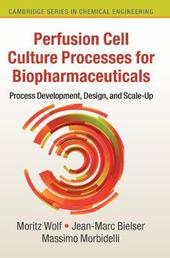
|
Perfusion Cell Culture Processes for Biopharmaceuticals: Process Development, Design, and Scale-up
Hardback
Main Details
| Title |
Perfusion Cell Culture Processes for Biopharmaceuticals: Process Development, Design, and Scale-up
|
| Authors and Contributors |
By (author) Moritz Wolf
|
|
By (author) Jean-Marc Bielser
|
|
By (author) Massimo Morbidelli
|
| Series | Cambridge Series in Chemical Engineering |
|---|
| Physical Properties |
| Format:Hardback | | Pages:216 | | Dimensions(mm): Height 250,Width 175 |
|
| Category/Genre | Molecular biology
Biotechnology |
|---|
| ISBN/Barcode |
9781108480031
|
| Classifications | Dewey:615.19 |
|---|
| Audience | | Professional & Vocational | |
|---|
| Illustrations |
Worked examples or Exercises; 55 Line drawings, color; 30 Line drawings, black and white
|
|
Publishing Details |
| Publisher |
Cambridge University Press
|
| Imprint |
Cambridge University Press
|
| Publication Date |
6 August 2020 |
| Publication Country |
United Kingdom
|
Description
Master the design and operation of perfusion cell cultures with this authoritative reference. Discover the current state-of-the-art in the design and operation of continuous bioreactors, with emphasis on mammalian cell cultures for producing therapeutic proteins. Topics include the current market for recombinant therapeutic proteins, current industry challenges and the potential contribution of continuous manufacturing. Provides coverage of every step of process development and reactor operation, including small scale screening to lab-scale and scale-up to manufacturing scale. Illustrated through real-life case studies, this is a perfect resource for groups active in the cell culture field, as well as graduate students in areas such as chemical engineering, biotechnology, chemistry and biology, and to those in the pharmaceutical industry, particularly biopharma, biotechnology and food or agro industry.
Author Biography
Moritz Wolf is a management consultant at McKinsey & Company and a former post-doctoral fellow at ETH Zurich in the department of Chemistry and Applied Biosciences. He has obtained the degree of Doctor of Science from ETH Zurich. Jean-Marc Bielser is an associate manager in the Biopharma Technology and Innovation group at Merck Serono SA (Switzerland). He obtained his master in Chemical Engineering and Biotechnology from EPFL, and the degree of Doctor of Science from ETH Zurich. Massimo Morbidelli is Professor Emeritus in the Department of Chemistry and Applied Biosciences at ETH Zurich and Professor at the Department of Chemistry, Materials and Chemical Engineering at the Politecnico di Milano. Member of the Italian Academy of Sciences (Accademia dei Lincei), he received the Excellence in Process Development Research Award in 2017 from the American Institute of Chemical Engineers, the 2018 Separations Science and Technology Award from the American Chemical Society and the 2019 Award in Integrated Continuous Biomanufacturing. He is the co-author of Continuous Biopharmaceutical Processes (Cambridge, 2018), and Parametric Sensitivity in Chemical Systems (Cambridge, 2005).
Reviews'Captures in a masterful way the many dimensions of perfusion cell culture technology, including its history, key concepts, relevant cell biology, hardware and instrumentation, mathematical modeling, and scale up technics, all supported by lucid examples that will resonate with the biotechnology professional. The book captures the cutting-edge advances in the field achieved only over the last few years, with a broad applicability to the manufacture of traditional molecular biotherapeutic, as well as complex new modalities, such as gene and cell therapies, and vaccines. Not surprisingly, the leading expertise of [this] team in continuous downstream operation is reflected in the introduction of a fully integrated continuous biomanufacturing platform, which has all the requisite qualities to become the dominant architectural design of the future.' Konstantin Konstantinov, Codiak BioSciences 'A delightful guide full of important information for those of us who want to make perfusion great again thanks to the appearance of new cell retention technologies, single use bioreactors and sensors. It will greatly help biotech developers to better understand the fundamentals of cell culture in perfusion, to design appropriately their systems and to control optimally their processes in order to deliver high quality product at a better cost efficiency than the classical large-scale fed-batch processes.' Herve Broly, Biotech Process Sciences
|